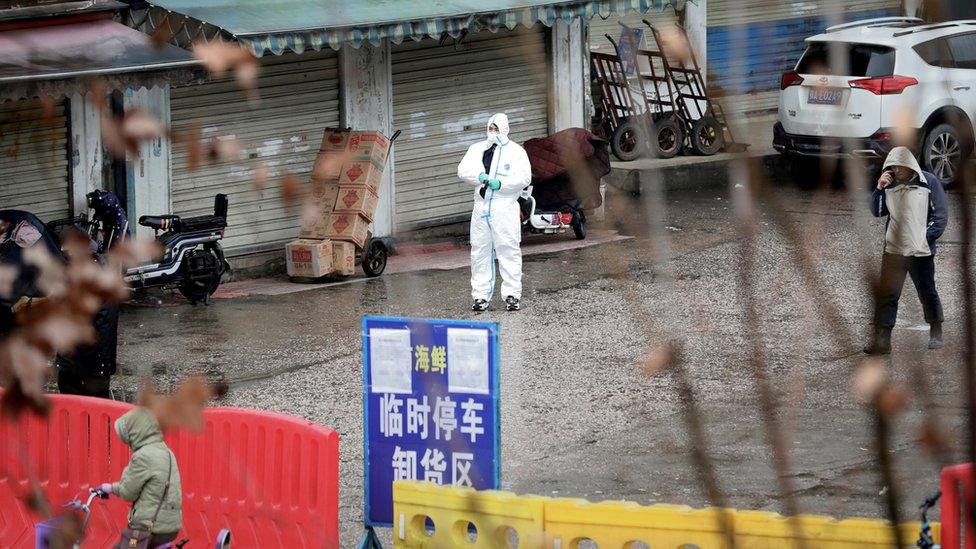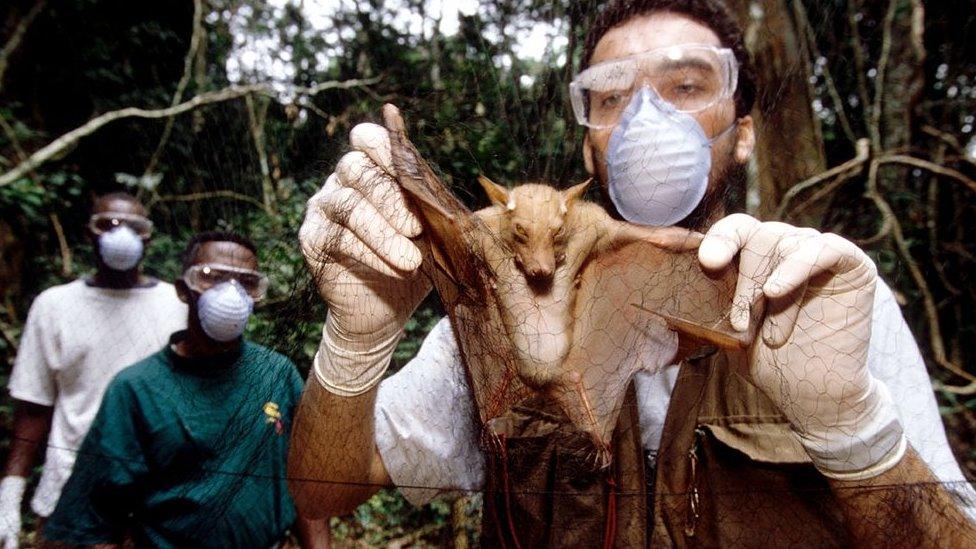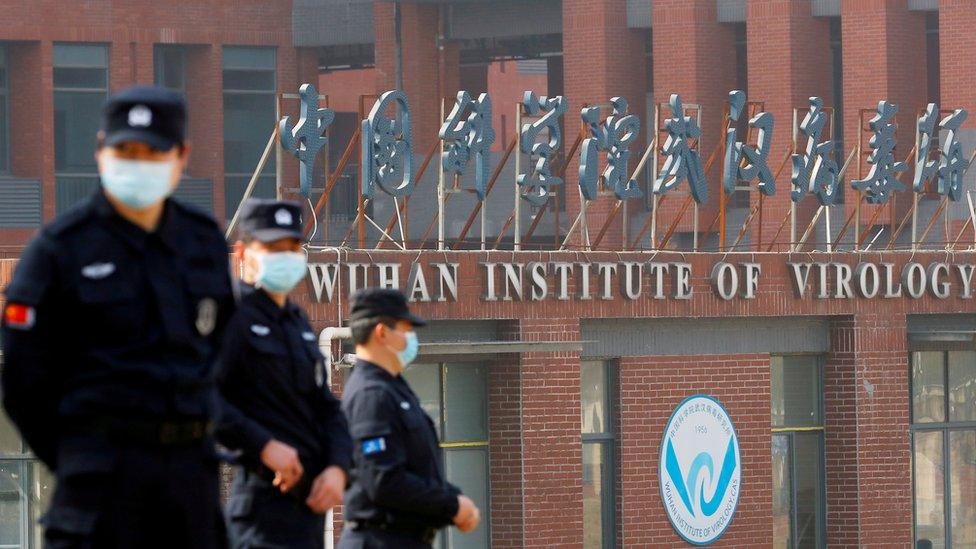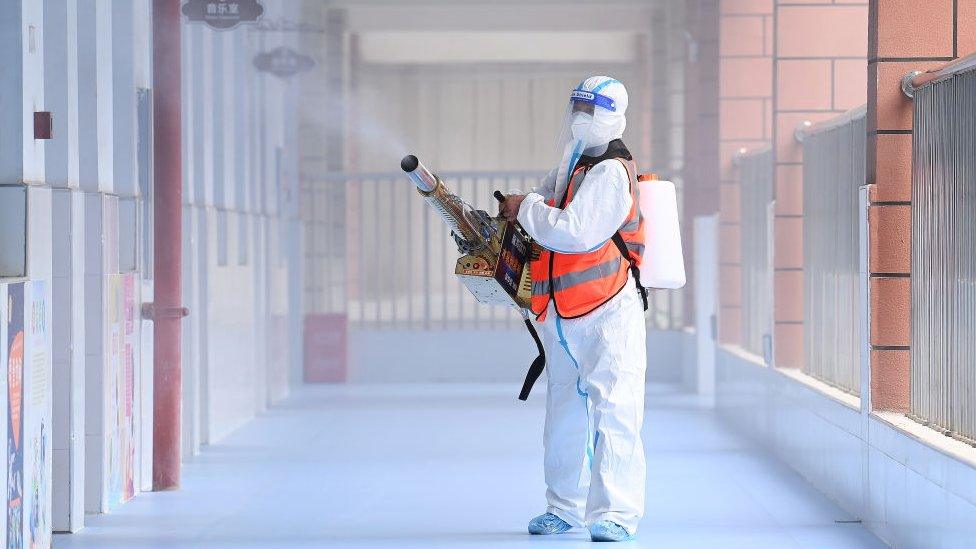Search for Covid's origins stalled, scientists say
- Published

Further delays could make crucial studies "biologically impossible", researchers say
"The window of opportunity" to conduct crucial studies into how the Covid-19 pandemic started is closing, senior scientists have said.
A team appointed by the World Health Organization to find the cause of the outbreak say the process has stalled.
And further delay could make crucial studies "biologically impossible".
In an article in the scientific journal Nature, external, they call on political and scientific leaders to expedite those studies "while there is still time".
Dutch virologist Prof Marion Koopmans, a member of the WHO team, told BBC Radio 4's Inside Science programme the risk of pandemics was increasing.
"Because of the way the world is changing - population increase, crowding and more interaction between humans and animals, we need to learn where things go wrong and how we can avoid that in the future," she said.
The WHO team visited Wuhan in January and published a report in March recommending:
searching blood banks in China and other countries for antibodies to the virus in blood donated in the months preceding the December 2019 outbreak
taking samples from farmed wild animals such as mink and racoon dog that might be the "intermediate host" that allowed the virus to jump species

Similar to the Ebola outbreak, the coronavirus's "ancestor" is believed to have been a disease carried by wild bats
But since farmed animals have a limited lifespan and blood banks store donations for a fixed period, the researchers are worried that valuable biological information may already have been lost.
The politically contentious issue of whether the virus might have escaped from a laboratory in China had also made some of the work more difficult, Prof Koopmans said.
All the lines of inquiry were relevant, she said, "but when accusations get mixed with the scientific questions, things become quite difficult".
In their report, however, the team concluded while it was impossible to determine how the virus had infected the first humans, "all available evidence" suggested it had a natural animal origin and was "not a manipulated or constructed virus".
Sparked controversy
The closest relative to Sars-Cov-2, Prof Koopmans said, was a virus found in wild bats.
But there remained a significant "time gap" in the evolution of that virus into the one that infected humans that could be explained only by taking samples from the animals that may have provided an "intermediate host".
The report itself, however, sparked controversy that now threatens to overshadow the science.
The team essentially "graded" the different possible origin scenarios.

Lab-leak theories centre on the Wuhan Institute of Virology
Most likely, they said, was a farmed animal, possibly a wild species on a fur farm, was that "intermediate host" between bats and humans.
And the possibility the virus leaked from a laboratory in China was "highly unlikely".
But this led some scientists and commentators to suggest the "lab-leak theory" had been dismissed.
"In retrospect, the exact phrasing - 'extremely unlikely' - maybe wasn't the smartest way of putting things, given that that has become the core of the debate," Prof Koopmans told BBC News.
"But it really was about - given everything we know, where would you prioritise [the next scientific steps]."
Accidentally released
The continuing furore over the lab-leak theory has centred on the Wuhan institute of Virology, where the WHO team spent time interviewing researchers.
"If we're talking about an accident in that laboratory, then you would still have to have that exact same virus in the lab for it to be accidentally released," Prof Koopmans said. "We found no indication of that."
However, other scientists would like to examine the database of viruses held by the WIV, which was taken offline on 12 September 2019.
Amid the lab-leak debate, President Joe Biden ordered US intelligence to hold its own investigation.
But its report, delivered to the president this week, was unable to reach a conclusion about whether the virus emerged naturally or as a result of an accident at a lab, according to US media.
'Bad bugs'
Meanwhile, Prof Koopmans said we may never find "patient zero" in the case of the Covid-19 pandemic.
But without the more scientific studies, there was no chance of reaching a conclusion about the vital question of how a bat virus had unleashed a pandemic that was continuing to cause sickness, death and economic chaos around the world.
"We have to really try - but there's no guarantee of success," she said..
"But what we do need to learn is, how can we recognise which are the really 'bad bugs'.
"There is a whole range of [bat viruses], so which of those really are the high-risk ones?
"And how can we recognise that?
"That's the kind of thing that we really could learn and take forward from these studies."
Hear the interview with Professor Marion Koopmans in full on Inside Science on BBC Sounds.
Follow Victoria on Twitter, external.
Related topics
- Published25 August 2021

- Published10 July 2021
